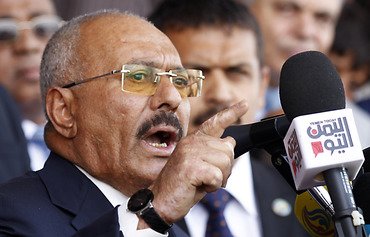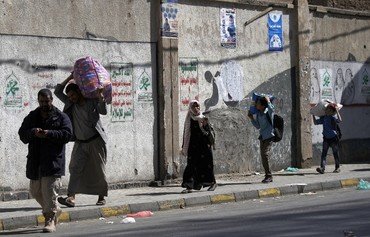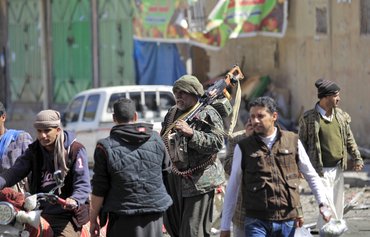The Iranian regime's support for the Houthis' killing of former Yemeni President Ali Abdullah Saleh represents a turning point against Iran and its allies in terms of a decline in popular support, Yemeni experts told Al-Mashareq.
On December 2nd, Saleh announced a popular uprising against the Houthis, triggering clashes between his General People’s Congress (GPC) and the Republican Guard on one side, and the Houthis (Ansarallah) on the other.
The Houthis killed Saleh on December 4th, and assassinated or detained some GPC and tribal leaders who supported him, targeting the homes of others.
Islamic Revolutionary Guard Corps (IRGC) commander Mohammad Ali Jaafari said the killing of the former Yemeni president marked "the foiling of the coup against Ansarallah in its own homeland".
According to various media reports, Jaafari also accused Saudi Arabia of undermining security in the region.
A report in hardline Iranian newspaper Kayhan, titled "Hidden Divine Gifts", hailed the killing of Saleh, describing the ex-president and his supporters in the popular uprising as "enemies" who sometimes take uncalculated steps.
The newspaper accused the Arab coalition of convincing Saleh to lead the movement against the Houthis in Sanaa, and said the Houthis had been "monitoring Saleh’s movements and the arrival of funds and weapons to him".
It described "the crushing of the massive conspiracy" that targeted the Houthis "to be a hidden divine gift to this steadfast [Yemeni] people".
Meanwhile, in its December 5th newscast, Hizbullah’s al-Manar TV channel delivered the following commentary on Saleh’s killing: "Every time they set a fire, God extinguishes it... and every time they prepare a paper, the days fold it... Ali Abdullah Saleh was killed, he who they honed as a knife for internal Yemeni infighting".
In a December 13th social media post, Saleh's nephew, Tawfiq, claimed his uncle's killing had been carried out on the orders of Iran.
A tactic used by the IRGC
"Saleh’s killing is obviously the same tactic the IRGC had used against their opponents after the outbreak of the Iranian Islamic revolution, and also against some of their own allies," Abaad Centre for Strategic Studies director Abdulsalam Mohammed told Al-Mashareq.
"Iranian experts are present in Sanaa and they are the ones directing the war and the conflict, to the point that the Houthis cannot carry out the assassination of Saleh without Iran’s approval, even though they benefitted from their alliance with him," he said.
"They had reached a breakpoint because he had begun to work against them," Mohammed added.
"Iran’s celebration of Saleh’s killing in the media confirms its support and approval of his killing, even though it is in conflict with the interest of most Yemenis and will have an effect on the Houthis’ strength in the future," he said.
This is already in evidence, he said, as Yemeni forces backed by the Arab coalition are advancing in al-Khokha area towards al-Hodeida province.
"Iran’s strong presence through its Houthi allies, their experts on the ground and their missiles, confirms Iran’s full involvement and culpability for all the unfortunate events in Yemen and the region," Mohammed added.
'Getting rid of Saleh was an original goal of the Houthis'
"I think Iran did not tolerate the attack on its embassy in Sanaa [on December 4th], which, in the context of its regional confrontation with Saudi Arabia, signaled the end of Iranian influence in Sanaa," said political analyst Yassin al-Tamimi.
At the same time, he told Al-Mashareq, the Arab coalition scored a victory for its own side by succeeding in changing Saleh's position.
"For this reason, this does not rule out that Saleh’s killing was one of the options that Iran supported to end a battle that is very critical from the military and strategic standpoint [in its favor]," he said.
"Perhaps the support expressed by Iranian leaders for Saleh’s killing is evidence that Iran has viewed Saleh as a real threat to its project in Yemen, and so it approved expediting his liquidation," he said.
Saleh's liquidation was "an original Houthi goal despite the alliance that existed between the two coup partners, for the Iranian project does not accept power sharing", he added.

![Houthi fighters are seen outside of the residence of Yemen's former President Ali Abdullah Saleh who was killed by the militia as he was fleeing Sanaa on December 4th. [Mohammed Huwais/AFP]](/cnmi_am/images/2017/12/25/10856-Yemen-Sanaa-Houthis-600_384.jpg)






